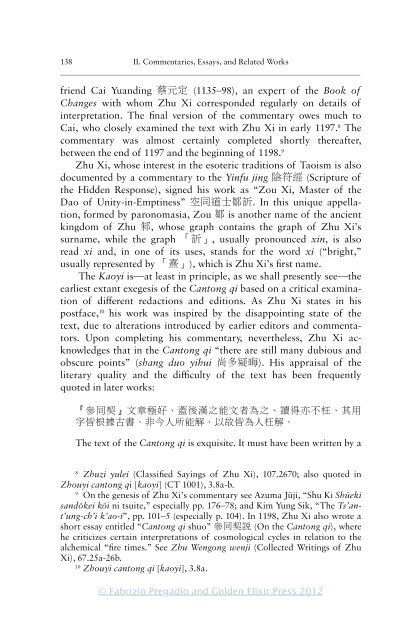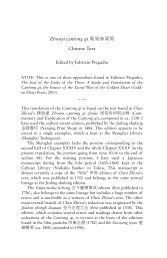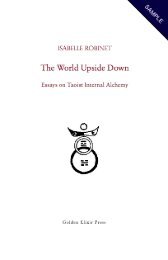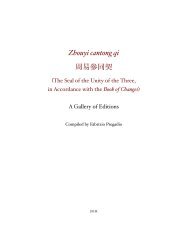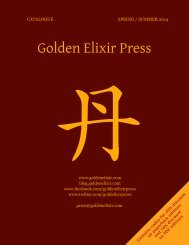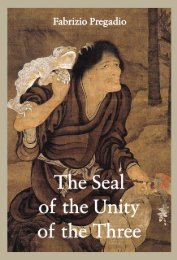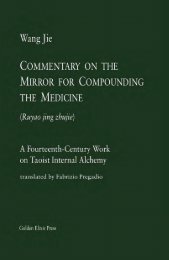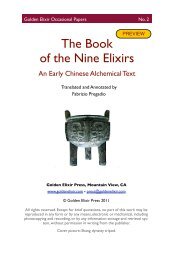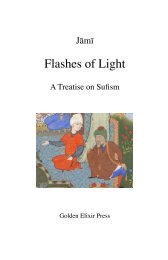The Seal of the Unity of the Three â Vol. 2 - The Golden Elixir
The Seal of the Unity of the Three â Vol. 2 - The Golden Elixir
The Seal of the Unity of the Three â Vol. 2 - The Golden Elixir
- No tags were found...
You also want an ePaper? Increase the reach of your titles
YUMPU automatically turns print PDFs into web optimized ePapers that Google loves.
138 II. Commentaries, Essays, and Related Works<br />
—————————————————————————————————————————<br />
friend Cai Yuanding 蔡 元 定 (1135–98), an expert <strong>of</strong> <strong>the</strong> Book <strong>of</strong><br />
Changes with whom Zhu Xi corresponded regularly on details <strong>of</strong><br />
interpretation. <strong>The</strong> final version <strong>of</strong> <strong>the</strong> commentary owes much to<br />
Cai, who closely examined <strong>the</strong> text with Zhu Xi in early 1197. 8 <strong>The</strong><br />
commentary was almost certainly completed shortly <strong>the</strong>reafter,<br />
between <strong>the</strong> end <strong>of</strong> 1197 and <strong>the</strong> beginning <strong>of</strong> 1198. 9<br />
Zhu Xi, whose interest in <strong>the</strong> esoteric traditions <strong>of</strong> Taoism is also<br />
documented by a commentary to <strong>the</strong> Yinfu jing 陰 符 經 (Scripture <strong>of</strong><br />
<strong>the</strong> Hidden Response), signed his work as “Zou Xi, Master <strong>of</strong> <strong>the</strong><br />
Dao <strong>of</strong> <strong>Unity</strong>-in-Emptiness” 空 同 道 士 鄒 訢 . In this unique appellation,<br />
formed by paronomasia, Zou 鄒 is ano<strong>the</strong>r name <strong>of</strong> <strong>the</strong> ancient<br />
kingdom <strong>of</strong> Zhu 邾 , whose graph contains <strong>the</strong> graph <strong>of</strong> Zhu Xi’s<br />
surname, while <strong>the</strong> graph 「 訢 」, usually pronounced xin, is also<br />
read xi and, in one <strong>of</strong> its uses, stands for <strong>the</strong> word xi (“bright,”<br />
usually represented by 「 熹 」), which is Zhu Xi’s first name.<br />
<strong>The</strong> Kaoyi is—at least in principle, as we shall presently see—<strong>the</strong><br />
earliest extant exegesis <strong>of</strong> <strong>the</strong> Cantong qi based on a critical examination<br />
<strong>of</strong> different redactions and editions. As Zhu Xi states in his<br />
postface, 10 his work was inspired by <strong>the</strong> disappointing state <strong>of</strong> <strong>the</strong><br />
text, due to alterations introduced by earlier editors and commentators.<br />
Upon completing his commentary, never<strong>the</strong>less, Zhu Xi acknowledges<br />
that in <strong>the</strong> Cantong qi “<strong>the</strong>re are still many dubious and<br />
obscure points” (shang duo yihui 尚 多 疑 晦 ). His appraisal <strong>of</strong> <strong>the</strong><br />
literary quality and <strong>the</strong> difficulty <strong>of</strong> <strong>the</strong> text has been frequently<br />
quoted in later works:<br />
『 參 同 契 』 文 章 極 好 、 蓋 後 漢 之 能 文 者 為 之 、 讀 得 亦 不 枉 、 其 用<br />
字 皆 根 據 古 書 、 非 今 人 所 能 解 、 以 故 皆 為 人 枉 解 。<br />
<strong>The</strong> text <strong>of</strong> <strong>the</strong> Cantong qi is exquisite. It must have been written by a<br />
8<br />
Zhuzi yulei (Classified Sayings <strong>of</strong> Zhu Xi), 107.2670; also quoted in<br />
Zhouyi cantong qi [kaoyi] (CT 1001), 3.8a-b.<br />
9<br />
On <strong>the</strong> genesis <strong>of</strong> Zhu Xi’s commentary see Azuma Jūji, “Shu Ki Shūeki<br />
sandōkei kōi ni tsuite,” especially pp. 176–78; and Kim Yung Sik, “<strong>The</strong> Ts’ant’ung-ch’i<br />
k’ao-i”, pp. 101–5 (especially p. 104). In 1198, Zhu Xi also wrote a<br />
short essay entitled “Cantong qi shuo” 參 同 契 說 (On <strong>the</strong> Cantong qi), where<br />
he criticizes certain interpretations <strong>of</strong> cosmological cycles in relation to <strong>the</strong><br />
alchemical “fire times.” See Zhu Wengong wenji (Collected Writings <strong>of</strong> Zhu<br />
Xi), 67.25a-26b.<br />
10<br />
Zhouyi cantong qi [kaoyi], 3.8a.<br />
© Fabrizio Pregadio and <strong>Golden</strong> <strong>Elixir</strong> Press 2012


